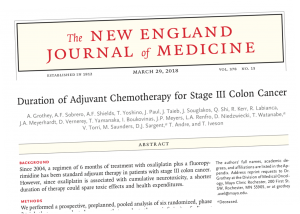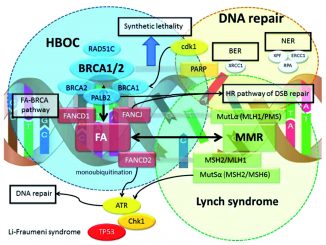Are 6 months of adjuvant chemotherapy really necessary for a patient with a stage III colorectal cancer? The answer should be “yes”, at least according to a paper recently published on the New England Journal of Medicine by Axel Grothey from the Division of Medical Oncology, Mayo Clinic Cancer Center, Rochester, USA, and colleagues.
 Strictly looking at facts and figures, the prospective, preplanned, pooled analysis of the six randomized, phase III trials included in the International Duration Evaluation of Adjuvant Therapy (IDEA) collaboration did not formally prove the non-inferiority of 3 months of oxaliplatin-based adjuvant therapy as compared with 6 months for the overall population, in a setting of 12.834 patients with stage III colon cancer. Nevertheless, IDEA has already had an impact on clinical practice, leading to changes in some guidelines (i.e. NCCN Colon Cancer, Version 2.2018) and expert consensus.
Strictly looking at facts and figures, the prospective, preplanned, pooled analysis of the six randomized, phase III trials included in the International Duration Evaluation of Adjuvant Therapy (IDEA) collaboration did not formally prove the non-inferiority of 3 months of oxaliplatin-based adjuvant therapy as compared with 6 months for the overall population, in a setting of 12.834 patients with stage III colon cancer. Nevertheless, IDEA has already had an impact on clinical practice, leading to changes in some guidelines (i.e. NCCN Colon Cancer, Version 2.2018) and expert consensus.
“Six months of adjuvant oxaliplatin-based chemotherapy is standard for patients with stage III colon cancer following surgery. However, oxaliplatin is associated with peripheral neurotoxicity which worsens over treatment duration. Consequently, a shorter treatment duration, if equally effective, would be extremely beneficial” wrote on Annals of Oncology Alberto Sobrero, from Ospedale San Martino in Genova, Italy, co-author of the NEJM paper. “It’s not a question of ‘yes’ or ‘no’. The situation is much more nuanced and we should take into account many factors before choosing the right therapy for each single patient” he said during a panel discussion the XX Annual Congress of the Italian Association of Medical Oncology (AIOM, held in Rome in November 2018), where the majority of the specialists declared they still go for the 6-months regimen.
Going deeper into details, the IDEA analysis demonstrated that patients with stage III colon cancer can be divided in two groups based on the risk, and for patients in the low-risk group (T1-3, N1) authors recommend a 3-months adjuvant treatment, while for the high-risk group (T4 and/or N2) the 6-months regimen should be preferred. Moreover, it seems that also regimen counts. In patients treated with CAPOX (capecitabine + oxaliplatin), 3-months treatment was in fact as effective as 6-months regimen, with a dramatic reduction of the adverse events, especially in the low-risk group.
“Data published on the NEJM help us to inform our decisions on adjuvant therapy in these patients. I firmly believe that we should go beyond raw statistics, adding common sense, skills and experience to the numbers, but most of all talking to patients to really understand their needs and expectations” added Francesco Perrone, from from National Cancer Institute, G. Pascale Foundation in Naples, Italy.






Leave a Reply